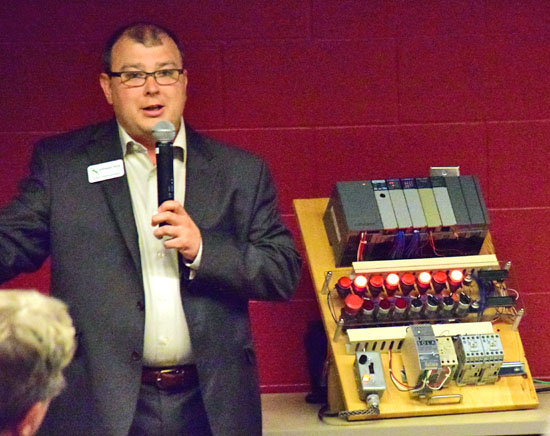Schools tout hybrid education programs
DAVE MOSIER/independent editor
The need for skilled-trades workers for available manufacturing jobs has spurred a collaborative effort by Vantage Career Center and Northwest State Community College to fill that need with local students.

Vantage and Northwest State held a Manufacturing Summit on Tuesday to show off new “hybrid” programs that combine virtual and traditional education in a more schedule-friendly program for high school grads and current workers who want to learn new skills in order to obtain higher-paying jobs.
Vantage Superintendent Staci Kaufman and Northwest State President Dr. Tom Stuckey welcomed representatives from area manufacturers, as well as other educators and government officials to the summit, held in Vantage’s Community Room.
Both talked about how manufacturers are the customers for skilled workers turned out by both schools, and how Vantage and NWSCC are meeting the needs of those customers with the new hybrid programs.
Kaufman said the programs were the result of roundtable discussions held with area manufacturers to find out what kinds of jobs were available and what skills were needed for those positions. Following the discussions, in which manufacturers noted that finding skilled-trades workers was their No. 1 concern, educators then spent nearly two years developing new hybrid skilled-trades programs that would meet the needs of area companies — and today’s non-traditional students.
“It’s important to understand that employers and employees have different needs and this is bringing it together,” the Northwest State president said of the new hybrid programs. “Time is critical and the component of training is critical, but the blending of this … we’re looking at new ways to do that.”
Tom Wylie, associate vice president-special projects, at Northwest State, provided information on the roundtable discussions, adding that Northwest State asked three basic questions: What skills were needed, how were NWSCC grads working out, and whether there were any barriers to training workers at Northwest State. He then went on discuss how the college is focusing on employers’ needs, and how to meet them.
In addition to providing the training needed to turn out skilled-trades workers, the new hybrid programs offer a more flexible learning environment for students who are currently in the workforce. Northwest State officials talked about the fact that some skilled-trades students already work and have trouble finding time to attend classes because of today’s fluctuating work schedules.
To meet the need of those students, Northwest State developed new virtual training applications, as well as providing open lab sessions, so students could receive quality training on their own timetable, but spend far less time in the classroom. The college also provides instructor availability on a more flexible schedule to assist students who need help.
Stuckey said the new programs target local students who have no work or school plans after high school. He also noted the issue is personal to him, since he has a grandson who would likely fall into that category when he graduates.
Todd Hernandez, vice president for innovation at Northwest State, and Jim Lammy, NWSCC adjunct professor/program developer, then demonstrated one of the new virtual programs, using both the actual training equipment and then showing how the “Virtual Farm” programs mirror the functionality of the equipment.
Sarah Stubblefield, iStar grant project manager for NWSCC, talked about how the $2.5-million the school received helped fund creation of the new programs, while Ron Scozzari, dean of industrial technology for Northwest State, talked about the hybrid classes as a new approach to teaching.
Hernandez later returned to talk about the need for area high schools to help in recruiting students, and their parents, into considering advanced manufacturing jobs. He noted that many high school guidance counselors are still urging many students to get a four-year college education, even though only approximately 30 percent of those students end up graduating. More troubling is the fact that those who graduate and those who drop out are often saddled with large college debts.
Dr. Stuckey and Kaufman also talked about the difficulty of obtaining — and keeping — trained instructors who can make higher salaries in the workforce. Because of the need for instructors, Hernandez is seeking commitments from area manufacturers to provide skilled-trades workers who could provide some of the instruction for NWSCC students. He noted the companies would be reimbursed for the time workers spent on instructional duties.
Kaufman said after the summit she was pleased to see administrators and educators from area schools districts at the meeting, as well as a number of government officials, including County Commissioners Thad Lichtensteiger and Todd Wolfrum and Van Wert City Council President Pete Weir, noting that a school-government-business partnership is essential in making the new programs work.
POSTED: 06/08/16 at 8:54 am. FILED UNDER: News







